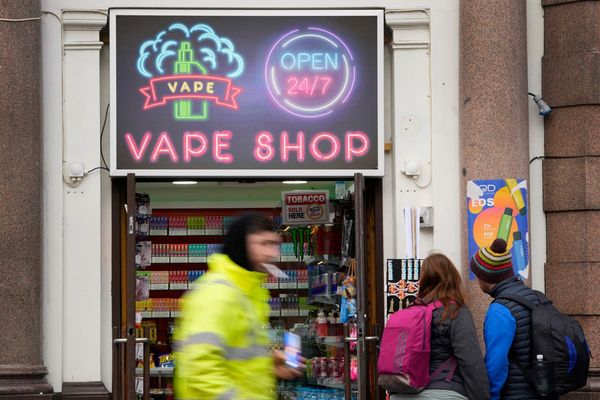
The Australian Medical Association was in Canberra on Friday pushing for parliament to pass laws to crack down on vaping, expected to be voted on in June.
It hasn’t been smooth sailing for Labor’s proposed ban on importation and penalties for commercial possession of vapes.
The Nationals want vapes regulated like cigarettes, with no prescription needed, and the same rules on plain packaging and excise taxes.
The Liberals at times allow their junior Coalition partner to set the course, and Peter Dutton has grumbled about prohibition. But the party also has its strident critics of vapes, including the shadow education minister, Sarah Henderson, who describes them as a “scourge” in schools.
The crossbench and Greens are usually the safest path through the Senate. The Greens health spokesperson, Jordon Steele-John, agreed with an inquiry report this month that called for the bill to be passed but in additional comments warned that the Greens do not “support the prohibition of vapes for adults”.
Instead, the party “will work towards a carefully regulated scheme that focuses on public health outcomes, reducing harm and minimising the use of vaping products”.
That is likely to include amendments to ensure individuals will not be criminalised for possession, to ensure adequate quit supports are in place and to restrict advertising of vapes to medical practitioners. The party will determine its position this fortnight.
The AMA president, Steve Robson, had a blunt message for “parliamentarians who seem to be listening to tobacco-based lobby groups and political donors rather than parents, health authorities and kids”.
“We hope we can get the opposition and other people to do the right thing and not listen to donors and protect Australian kids from vaping,” he told ABC News Breakfast.
Asked to be more specific about who, Robson later told reporters in Canberra he was “shocked” and “really disappointed” that the Nationals wanted to tax rather than ban vapes without a prescription. But he also put the hard word on the Greens.
“We think that the Greens are a party that put the future of the next generation at the heart of their policy, and this clearly is something they should support if they really, truly do put the health and wellbeing of children … as a priority.”
The bill creates a harsher regime of regulation for vapes than for cigarettes, despite the latter being more harmful. To prevent that anomaly, could cigarettes be phased out, as New Zealand tried before the new conservative government revoked the ban based on birth year?
When I asked the health minister, Mark Butler, this at the National Press Club in May 2023 he said the difference was “cigarettes have been with us for so long” but that vapes were still “relatively new”.
“If we knew now back then when cigarettes were being introduced, I would hope that governments would have stopped it, would have snuffed it out immediately, which is what I want to do to vapes.
“We have a closing window here before vapes become so widespread, so accepted, so normalised … that it would be very difficult to take any action.”
It’s not fair of well-intentioned health advocates to suggest that opponents of the ban are wholly and solely motivated by tobacco lobbying or donations, which the Greens don’t receive. In fact they want to ban donations from the tobacco industry, among others.
Some genuinely put a higher value on individual bodily autonomy than state paternalism. Some think prohibition is doomed to failure. Some disagree with Butler’s assessment that vapes are not yet entrenched.
The Greens are negotiating with the government. Given that Butler has repeatedly said the reforms are not about criminalising individual vapers, it should be possible to amend the bill to address their concerns.
The definition of a “commercial quantity” of vapes, which now would be set by regulations, could be set out in legislation instead.
The bill also has an offence of “possessing less than [a] commercial quantity of vaping goods” – which is intended to deter retailers and vendors – with an exemption for “personal use”.
The Greens have warned there is “a non-zero chance of this resulting in the criminalisation of users of illegally obtained vapes despite the personal use exemption”.
“This is because providing evidence of personal use for products obtained without a prescription would cause difficulty for most consumers, yet they would be required to do this to avoid being charged for possession.”
Everyone agrees kids shouldn’t be vaping but that doesn’t justify legislating something that is almost the toughest possible approach. It’s still incumbent on the government to show it would work.
And if the intent is not to criminalise individual vapers, the bill should be fixed to guarantee that it won’t.










